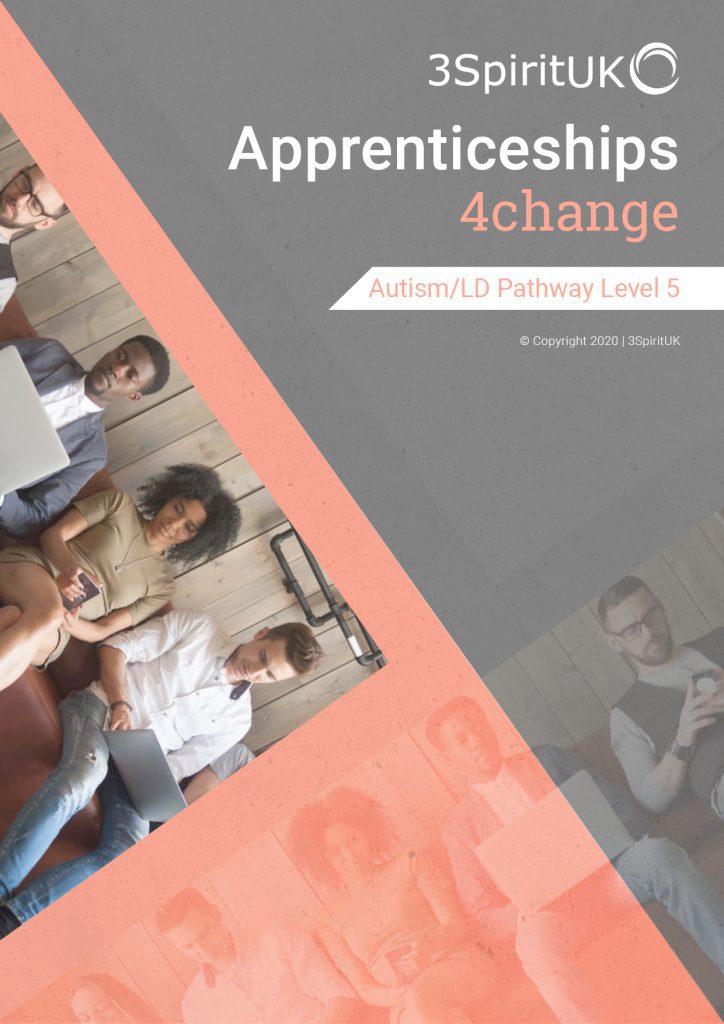Free Eventbrite Q&A Apprenticeship Events
Join us for a Q&A session about our newly developed Apprenticeships. Register here…
Leader in Care – Level 5 Autism / LD Pathway

Who is the programme for?
This programme suits both individuals who want to develop and grow their business and/or individuals who are aspiring managers. It is designed for people who are passionate about driving meaningful inclusive practice, and for those who aim to achieve an ‘outstanding’ service.
How long will the programme take and what is involved?
This programme is delivered over 18 months. It incorporates the Apprenticeship Standard Leader in Adult Care but is extended to include a robust development programme for best practice in autism.
Apprentices are required to complete 20% off the job. Commitment is important, as the programme will be tightly structured. The following activities can be expected as part of the individual learning process:
- Attending virtual classrooms
- Contributing to forums
- Completing assignments
- Guided Reading
- Reflective diaries
- Shadowing other members of the team
- Participating in audits
- Meetings
Apprentices will meet with their assessors once a month to review progress and access support and guidance. Apprentices will also have access to communities of practice and will be required to contribute and learn from these communities as part of the assessment process. They will have the opportunity to collaborate and learn from peers undertaking similar pathways. Apprentices will be required to actively participate in the virtual classrooms.
As part of the programme, candidates are permitted to select one of the two Positive Behaviour Support option units if they would prefer. The two option choices available are:
Y/616/9325 Lead active support – This unit is mapped to Level 5 and carries a credit of 4
H/616/9327 Implement the positive behavioural support model – This unit is mapped to Level 4 and carries a credit of 8. These option units will be very well supported by the built-in additional units offered by this pathway. Much of this pathway is cross mapped to the Positive Behaviour Support manager standards and, thus, are an intelligent choice for those interested in developing a positive behaviour support culture within their service.
End point assessment:
There will be an external assessment at the end of the programme once the apprentice has achieved the ‘gateway’ requirements. This includes achieving the Level 5 Diploma in Leadership and Management for Adult Care.
End-point assessment methods, timescales and location
The end-point assessment consists of two distinct assessment methods:
- Observation of Leadership
- Professional discussion
The end-point assessment must be completed over a maximum period of three months after the apprentice has met the EPA gateway requirements.
What will the apprentice achieve?
- Level 5 Diploma in Leadership and Management for Adult Care.
- Level 2 English and Maths (If not completed prior to starting the programme). For those with an education, health and care plan, or a legacy statement, the apprentice’s English and Maths requirement is Entry Level 3 at a minimum. For those whose primary language is British Sign Language (BSL), the qualification BSL is an alternative and viable qualification.
- Autism Pathway
What access are there to taught classrooms?
The apprentice will also have access to the following virtual classrooms:
- Manage the Self for Leadership in Adult Care
- Partnership Working in Adult Care
- Communication and Information Management in Adult Care
- Safeguarding and Protection in Adult Care
- Health and Safety Risk-taking and Risk Management in Adult Care
- Outcomes Based on Person-centred Practice in Adult Care
- Resource Management in Adult Care
- Lead and Manage a Team Within Adult Care
- Supervision and Performance Management in Adult Care
- Professional Development in Adult Social care
- Equality, Diversity and Inclusion in Adult Care
- Integrating Technology into Your Service
- Governance and Regulatory Processes in Adult Care Unit
- Decision Making in Adult Care
- Manage Continuous Improvement in Adult Care
- Managing Concerns and Complaints in Adult Care
- Entrepreneurial Skills in Adult Care
- Innovation and Change in Adult Care
- Leadership in Autism & LD Practice (part 1 & 2)
- Later Life Autism, Health, Mental Health, and Co-morbidity
- Wellbeing, Quality of Life (including sexuality) and Strengths-based Practice
- Legislation, Rights and Discrimination, Barriers to Service Provision



